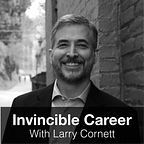The inspiration for this week’s topic comes from a podcast listener, LP Lin.
You mentioned that you ask questions to keep the conversation flowing. It sounds like an excellent topic for your next podcast: Smart questioning techniques of an interesting conversationalist : )
Larry, it’d be helpful if you’d reveal the different types of questioning techniques from the straight forward ‘Why’ to more advanced levels you used to spice up a conversation and minimise the risk of others feeling intimidated.
Conversational skills don’t come naturally for me — at all. I’m a bit shy in group settings. I’m an introvert who would prefer to fade back into a dark corner and observe the room.
However, I had to work on myself to get better at engaging with people since it was a useful skillset for my profession when I was a Product executive and doing a lot of public speaking and events. It’s even more important for me now as a leadership coach and career advisor.
Being a great conversationalist comes down to three things:
Preparation
Engagement
Curiosity
Preparation
I know that preparation sounds like homework 😐. While it can be for conversations in professional situations (e.g., job interviews, conference meetups, networking events), I’m speaking of preparation in a broader sense of taking a little time to learn more about the context and people in a given setting.
When you come up with some ideas related to an event, you’ll be prepared to have something interesting to discuss. For example, before I attended a meetup at a company’s headquarters, I browsed their recent press releases, product announcements, and other news in their industry. That made it easier to talk with people about something relevant with which they were familiar (e.g., one of their recent releases).
If you know who you will be meeting, do your homework. Read about their background, where they went to school, where they’ve worked, what they’ve written or posted online (within reason… don’t be creepy 🤣).
You can immediately build rapport with someone by discussing something about them. It shows that you cared enough to check them out and think about questions to ask and things to discuss.
I’ve had that happen, and I must admit that it’s a bit flattering! Despite what people might say, human beings enjoy a little flattery.
Engagement
This is where most people fall flat on their faces during a conversation. Everyone — ok, almost everyone — is distracted by their phones.
I’m sure you’ve also experienced a disappointing conversation with someone whose eyes were darting all around the room looking for someone “more important” to talk with next. Wow. Talk about making someone feel terrible.
Give your conversational partners 100% of your attention. 100%.
If you can’t do that, excuse yourself and leave. Don’t be that distracted person who phubs others, answers questions in a halfhearted manner, or constantly glances around the room.
The online version of this in Zoom meetings are the people who are obviously checking their email or reading Slack messages while you’re talking with them. Sure, this can happen in huge meetings when some exec is doing a long and boring All Hands update (yawn).
However, you shouldn’t do this to people in smaller meetings. It probably doesn’t feel great when people ignore you and act like anything else they're doing is more important than listening to you. Right? So, don’t tune out and make others feel unimportant.
You know that we can see the lighting on your face change as you switch between app windows, right? You do know that we can see your eyes scanning lines of text?
On the flip side, pay attention to your conversational partner — in person or on Zoom. How are they reacting? Note their facial expressions and watch their eyes (it’s pretty much all we have with video chat now).
You can tell when someone seems interested and actively engaged. You can also tell when you’re losing someone, and they might be getting bored because you’ve been talking for too long.
Remember, a good conversation is give and take. Each person should be speaking about 50% of the time.
Curiosity
There are actually five dimensions of curiosity. Being a curious person isn’t a binary trait of being curious about things or not.
The dimensions that Dr. Todd Kashdan et al. uncovered are:
Joyous Exploration - seeking knowledge and information with the joy of learning and growing
Deprivation Sensitivity - philosophically pondering complex ideas and solving problems
Stress Tolerance - a willingness to explore confusing, complex areas even when it causes anxiety and doubt
Social Curiosity (overt and covert) - curiosity about people and what they think and do
Thrill Seeking - taking risks to have varied and intense experiences
Overt social curiosity is a healthy interest in understanding other people's behaviors, thoughts, and feelings. As you might imagine, people high in this trait tend to also be high in empathy. This combination of traits can help someone be very tuned in to their conversational partner.
The best conversationalists that come to mind in my life are those who seemed genuinely curious about me. So much so that I wondered if they were faking it.
In my head, I remember thinking:
“Really? You’re interested in me? You want to know more about me and what I do?”
Regardless of their true intent, it worked. I enjoyed the attention, and the conversation felt natural as they asked more questions. And, in turn, I asked questions about them.
Asking open questions will often lead to a more interesting conversation. Closed questions that can be answered with “yes” or “no” make it more challenging to keep a conversation flowing. Instead, it feels like you’re grilling the other person.
For example, asking, “Do you work with Susan?” might lead to a quick answer that closes the door. But, asking, “How did you meet Susan?” will open the discussion to a more interesting story about that experience.
So, speaking of questions, let’s dive into some examples that you might find useful for your next conversation.
Questions - from simple to spicy
Gauge the receptivity of your conversational partner. It’s a social dance with subtle signals, ebb and flow, and testing the waters.
Some people will only be comfortable with a conversation that stays on the surface level of the event or situation. I’ve met people like that at conferences. We discussed the talks and panels, but they seemed reluctant to have the discussion drift into more personal questions about themselves and their work. You can’t force it.
Simple safe questions to break the ice
What has been your favorite talk so far?
How long have you been a part of this organization?
What advice would you give someone starting in this field?
What’s the most recent book you’ve read? Would you recommend it?
What’s the best conference you’ve ever attended?
What’s the most interesting thing you’ve been working on lately?
How do you feel about working from home?
What are your best tips for staying productive at home?
What professional skills are you focused on this year?
What’s your favorite restaurant in this city?
Where is the first place that you want to visit when we can travel again?
What’s your favorite app, and why?
What do you think of industry trend XYZ?
Have you watched any good movies this year?
Other people I’ve met at events were immediately more playful and fun to talk with. They would joke around, laugh often, and ask questions about my personal life.
"A stranger is just a friend you haven't met yet." - Will Rogers
It was almost like running into an old friend, but one I’d never met before. Soon, a small group of us were heading out for dinner and drinks. Ah, I miss those days…
Daring and fun questions
In what ways has social media made our lives both better and worse?
As a child, what did you want to be when you grew up?
What is the secret to happiness?
Where did you grow up? What was it like growing up there?
Would you be interested in colonizing Mars? Why or why not?
Do you think there is other life in the universe? Why or why not?
How will AI help us and hurt us?
If you could restart your career from the beginning, would you still choose this path?
What is your biggest regret in life?
What would you change in your life if you could start over?
What are the top five things on your bucket list?
What motivates and inspires you?
What’s your favorite way to spend the weekend?
Who do you look up to in the industry?
What’s the worst travel experience you’ve had?
What’s your go-to karaoke song?
What would happen if we legalized all drugs?
If you could only have one album on our Spotify playlist, what would it be?
What’s the best advice you’ve ever received?
Where would you want to build your dream home?
What is your idea of a dream job?
What is the next big adventure you want to pursue?
Who is your favorite author, and what is the best book they’ve written?
In my life, I’ve had a few friends and family members (very few) who were willing to get into deep philosophical and metaphysical discussions about the meaning of life, the existence of time, good and evil, reality vs. our perception of it, etc.
We enjoyed hurting each other’s brains with questions and conversations about life and death, psychology, economics, and any other crazy things that would pop into our heads.
Make sure you are really comfortable with other people before you head down this path. Otherwise, they might feel intimidated, shocked, and make a quick exit.
Spicy questions for the bold
What’s the one thing holding you back from doing what you really want to do?
Are we living in a simulation? How could you even tell if we are or not?
What is something you’ve never told anyone?
If all you can do is perceive the world around you through your sensory systems, how do you really know if anything exists?
What is your weirdest quirk?
How do you know that your “reality” isn’t just a hallucination occurring in your brain?
What would happen if we implemented Universal Basic Income?
What would you do if you never had to work again?
How do you know that you’re not lying in a coma right now, dreaming all of this?
Are some people born evil?
What do you really think happens after we die?
What’s stressing you out this week?
What would you do with your life if you knew you were immortal?
What’s one way I could help you?
Are you looking forward to retirement? Why or why not?
Do you know what the big secret is?
Maybe you’ve already figured this out from what I’ve been saying. The secret to being a great conversationalist is:
Showing a genuine interest in your conversational partner.
That means asking lots of questions, truly listening to the answers, following up with more relevant questions, and letting the conversation flow naturally from what you hear them say.
The sample questions I shared above are just some ideas for breaking the ice and having fun. In a real conversation, you wouldn’t pepper the person with an endless stream of unrelated questions like that.
If you’ve watched a talented interviewer on television or observed one in person, you probably noticed how they dovetail their reaction to an answer and ask natural follow-up questions to keep the conversation going. They help keep the discussion on track thematically.
For example:
“What’s the most interesting thing you’ve been working on lately?”
(Their answer…)
“Oh, I read about that! It sounds really cool. What’s the biggest challenge you’ve faced with it?”
(Their answer…)
“Ah, yes. I’m familiar with that pain. I ran into that on a project last year. Are you using solution XYZ to address it?”
(Their answer…)
“Interesting, I haven’t heard about that before. How do you like it?”
And so on…
Avoid these mistakes
Occasionally, I run into someone who does one or more of the following during a conversation. Unsurprisingly, I then do everything I can to avoid being pulled into a discussion with this person in the future.
Dominating the conversation or talking endlessly about themself (e.g., “So, it all began when I was six years old… and then I went to college… and then I started my first job…”)
Bragging and humblebragging (e.g., “So, I turned to Zuck and said, ‘You know what? We should buy Instagram!’ and everyone in the room was blown away by my brilliance.”)
Trivializing something you say (e.g., “Oh, you liked that book? I thought that it was too superficial. Not really my preference.”)
One-upping you (e.g., “That’s nothing! I had a product launch last quarter that was twice as big as that one and delivered 3x the revenue.”)
Correcting you, acting as if they know more than you do, and telling you what you should think, feel, or do — AKA mansplaining — (e.g., “That bothered you? You shouldn’t let it get to you. What you really should do next time is…”)
Barely paying attention to you while they impatiently wait for their turn to talk (e.g., “Right, right. Ok. Well, anyway… this is what I’ve been doing lately.”)
Conversational skills matter
If you are lucky enough to find yourself with someone who also understands the nuances of a delightful conversation, they will be asking you just as many questions as you ask them. You’ll notice that they are paying attention to what you say. You will feel like they are genuinely interested in you.
Everyone wants to be seen.
We want to be heard.
We want to feel like we matter.
One of the greatest gifts you can give another human being is your full attention in a conversation so that they can feel this way — if only for a brief moment in time.
If you do this, they will remember you fondly forever.
A way to support my newsletter
I know that not everyone is ready to become a paid subscriber. But, there is a great way you can support my work without spending any money:
Recommending my newsletter on social media.
It only takes a few seconds, and it helps grow my business so I can continue making time to write it.
I'll even provide some copy and paste text to make it easy to share on Twitter, LinkedIn, Facebook, etc.
I've really been enjoying the Invincible Career newsletter by Larry Cornett (@cornett). If you want to get ahead in your career and you aren’t subscribed yet, you’re missing out.
Thanks in advance!
This week’s professional development challenge
⭐ Choose hosting for your website
You’re learning how to set up and run your own website on your own domain. Remember, this is for the rest of your online life, so the investment in your skills and knowledge is worth it. You will control the destiny of your “online home.”
Larry Cornett is a leadership coach and business advisor who runs a supportive online community. He lives in Northern California near Lake Tahoe with his wife and children, and a gigantic Great Dane. He does his best to share advice that can help others take full control of their work and life. He’s also on Twitter @cornett.












